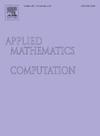The role of environmental feedback in promoting cooperation among unequal groups
IF 3.5
2区 数学
Q1 MATHEMATICS, APPLIED
引用次数: 0
Abstract
Cooperation plays a crucial role in addressing social dilemmas, yet inequality complicates the achievement of cooperation. This paper explores how environmental feedback mechanisms influence the evolution of cooperation within unequal groups. We construct a public goods game model that includes productivity and endowment inequalities and introduce a dynamic environmental feedback mechanism to study individual strategy choices in different environmental states. The results indicate that appropriate environmental feedback significantly improves cooperation levels. When there is only productivity inequality, appropriate environmental feedback increases the tendency of all individuals to cooperate, especially those with low productivity. In both productivity and endowment inequality, participants maintain a high level of cooperation when the initial endowment distribution falls within a certain range. Once the initial distribution of endowments exceeds this range, cooperative behavior quickly deteriorates. Our study provides a promising approach to enhancing the propensity for cooperation in unequal populations and highlights the significant role of adequate environmental feedback in promoting cooperation.
环境反馈在促进不平等群体之间合作中的作用
合作在解决社会困境中发挥着至关重要的作用,但不平等使合作的实现复杂化。本文探讨了环境反馈机制如何影响不平等群体内部合作的演变。本文构建了包含生产率和禀赋不平等的公共物品博弈模型,并引入动态环境反馈机制,研究了不同环境状态下个体的战略选择。结果表明,适当的环境反馈显著提高了合作水平。当只有生产率不平等时,适当的环境反馈会增加所有个体的合作倾向,尤其是那些生产率较低的个体。在生产率和禀赋不平等中,当初始禀赋分配落在一定范围内时,参与者保持较高的合作水平。一旦初始禀赋的分配超过了这个范围,合作行为就会迅速恶化。我们的研究为提高不平等人群的合作倾向提供了一种有希望的方法,并强调了充分的环境反馈在促进合作中的重要作用。
本文章由计算机程序翻译,如有差异,请以英文原文为准。
求助全文
约1分钟内获得全文
求助全文
来源期刊
CiteScore
7.90
自引率
10.00%
发文量
755
审稿时长
36 days
期刊介绍:
Applied Mathematics and Computation addresses work at the interface between applied mathematics, numerical computation, and applications of systems – oriented ideas to the physical, biological, social, and behavioral sciences, and emphasizes papers of a computational nature focusing on new algorithms, their analysis and numerical results.
In addition to presenting research papers, Applied Mathematics and Computation publishes review articles and single–topics issues.

 求助内容:
求助内容: 应助结果提醒方式:
应助结果提醒方式:


